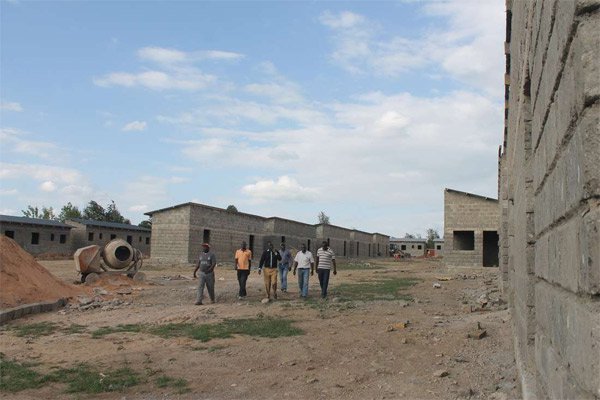Owning a house in Kenya: There is a saying that says that If you want to go fast, go alone. If you want to go far, go together. It is in the spirit of this saying that a group of boda boda riders in Nanyuki were able to pool their resources together an establish a housing project worth close to Sh. 00 million. You can read all about them here in this feature that was first published in the Kenyan business newspaper, Business Daily by MWANGI NDIRANGU:
From an initial daily savings of Sh. 50, boda boda operators in Nanyuki town, Laikipia County, became the proud house owners in a project worth Sh. 95 million.
The motorcycle taxi operators came together in 2011 and formed a chama from which members could borrow money to buy spare parts or bail themselves out in case they were arrested by the traffic police.
Gradually, the scope of the chama widened and the Nanyuki Boda Boda Sacco (Nabosa) was registered with the aim of helping members buy new motorcycles.
Then, in 2015, the idea of a housing project was born. Many of them say they had never dreamt possible. Some ended up in this occupation just to escape joblessness and had to get loans from relatives and financial institutions to buy boda bodas.
“I had never imagined owning a parcel of land, leave alone a house, before the age of 30. It seems too good to be true,” says James Mwangi, who operates near the Nanyuki Central Park.
As 2017 came to an end, it was a Christmas gift for Mr Mwangi and 59 others as they moved in to their starter units, popularly known as bedsitters, each worth Sh. 700,000, in the first phase of the project.
The second phase of the project, which began in January 2018, saw the completion of one-bedroom houses worth Sh. 960,000 each. These units were for the other 60 group members.
Located in Ichuga village seven kilometres from Nanyuki town and two kilometres from the Nanyuki-Nyeri Highway, the houses are in a gated community on a six-acre piece of land that cost Sh. 7 million.
The 120 beneficiaries are members of Nabosa Housing Cooperative Society, an offshoot of the Nanyuki Boda Boda Sacco. The housing cooperative was formed in October 2015 soon after the members bought the land. But before then, they had been contributing a minimum of Sh. 350 weekly.
When the idea of the housing scheme started taking root, the 120 members were required to ensure that their savings added up to Sh. 120,000 by December 2016. To carry out the project, riders partnered with the National Cooperative Housing Union (Nachu), which is financing it.
“Our members were supposed to have raised Sh. 159,000 by December 2017 to be allowed to occupy the small houses and then pay the balance within five years as per our agreement with Nachu,our main financier,” explains Nabosa Housing Sacco Chairman Patrick Waithaka.
However, he adds that members were free to contribute more by the occupancy date to reduce the balance of the Sh. 700,000 loan.
“If, for instance, a member would have saved Sh. 500,000 with Nabosa Housing Sacco by December 2017, he would have had an easy time paying the balance of Sh. 200,000 in five years,” he adds.
Already, the project is at an advanced stage, with roofing in progress on the work that began in July this year. Some space has been left for playgrounds, a commercial centre, an elevated water tank, a septic tank and internal roads.
Mr Waithaka says the second phase of the project is open to non-members. “We shall incorporate outsiders in the second phase since we still have enough space to build more houses,” says the chairman who, only a few years ago, was hawking socks.
Mr Waithaka, who is also the chairman of the Laikipia Boda Boda Sacco Unions, which boasts more than 10,000 members, says they got the idea of the housing project from their counterparts in Kitengela in Kajiado County, where a similar project had been carried out.
“I saw a news item on TV about Kitengela boda boda operators who had bought land and built houses for themselves. Afterwards, we requested the Laikipia County Government to fund the trip and following the visit, we decided to emulate what we had seen,” he says.
He attributes the success of the project to the advice of the county government and the local co-operative office, which have been guiding them on how to get financing. Owning a house in Kenya. Owning a house in Kenya.








